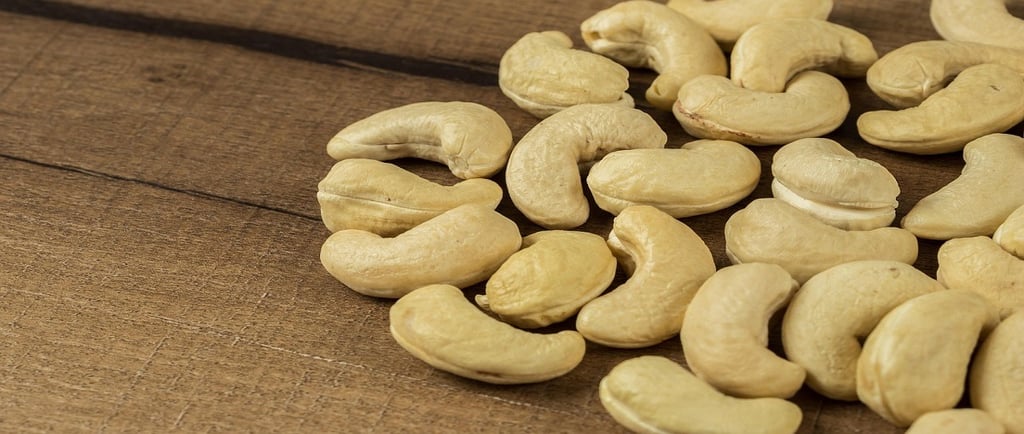Pros and Cons of Eating Cashews
Cashews are nutritious nuts with several health benefits. They contain antioxidants and nutrients like copper, zinc, and magnesium. Read this mini blog to learn more!


Cashews, scientifically called Anacardium occidentale, are originally from Brazil. However, they are cultivated in many hot tropical countries worldwide.
Cashews contain plant protein, fiber, healthy fats, and carbohydrates. They are also rich in beneficial plant compounds like polyphenols and carotenoids, which act as antioxidants.
The copper content of cashews is higher than that of any other nuts, which is beneficial for immunity, energy production, and brain health.
Cashews contain unsaturated fats that lower the risk of cardiovascular diseases. They are low in sugar and have a low glycemic index (GI) of 25, so it doesn't cause a blood sugar spike and can be used as a healthy snack.
According to the United States Department of Agriculture (USDA), cashews contain the following macronutrients and minerals.
Pros of Eating Cashews
1. Antioxidants like carotenoids and polyphenols in cashews can lower inflammation and protect the cells from damage.
2. Cashews contain plant protein and fiber that can make you feel fuller for longer and help with weight management.
3. They are rich in polyunsaturated and monounsaturated fats, which can lower triglycerides and cholesterol levels and improve heart health.
4. Nutrients like magnesium, vitamin K, and copper in Cashews can help strengthen bones.
5. Low sugar and a lower glycemic index of cashews can help manage type 2 diabetes.
6. Cashews contain antioxidants like lutein and zeaxanthin that improve vision. Zinc and vitamin E improve night vision and lower the risk of cataracts.
7. Regular consumption of cashews can improve brain function and reduce the risk of Alzheimer's and Parkinson's disease.
8. Cashews can reduce inflammation and lower the risk of chronic diseases like leprosy.
9. Fiber in cashews aids digestion and boosts gut health.
10. Moderate cashew consumption may help manage blood pressure.
11. Copper in cashews helps in melanin production, a natural pigment that makes hair dark and strong.
12. Cashews help in collagen production, which improves skin elasticity and slows down skin ageing.
Cons of Eating Cashews
1. Raw cashew shells contain urushiol, a toxic substance that can contaminate the kernel, which causes skin irritation. Roasting the raw cashew kernel removes any traces of urushiol.
2. People with a nut allergy should avoid cashew consumption.
3. Cashews are high in oxalates; excess consumption can cause kidney stones.
4. Cashews are a calorie-dense food, and overeating may cause weight gain.
5. Excess cashew consumption may cause gas, bloating, and constipation.
6. Cashew also contains omega-6 fatty acids, whose overintake can cause inflammation and heart disease.
7. If you are suffering from high blood pressure, avoid consuming salted cashews and eat unsalted dry-roasted ones.
Interesting Facts
1. Cashews are considered nuts, however, they are seeds.
2. The protein content of cashews is equivalent to cooked meat of the same weight.
3. Cashew nut shell liquid oil (CNSL) is used for lubricants and waterproof materials.
4. Roasted cashews contain more antioxidants than raw cashews.
5. Ivory Coast is the largest producer of cashews.





